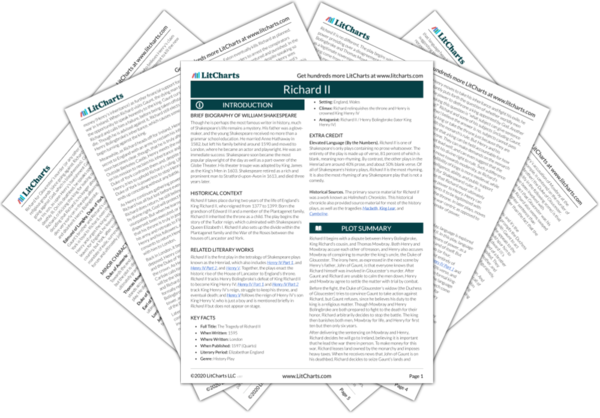Summary
Analysis
Henry and Northumberland enter to begin this scene, heading for Berkeley Castle even though they don’t quite know where it is. Soon Harry Percy enters, hoping to lend his service to Henry, whom he has never met. After they are introduced and Percy swears his loyalty, Percy says that Berkeley Castle is close and manned by 300 men.
The introduction of Henry and Percy is especially significant given their dispute in Henry IV Part 1, as Henry will at once battle with Percy and wish that he had Percy for a son instead of his own disappointing Hal.
Themes
At this moment Ross and Willoughby enter, and after them comes Berkeley, who carries a message for Henry, who in turn states that he is in England to stake a claim to his rightful inheritance, including the title of Lancaster. Berkeley says that the Duke of York has sent him.
Here, Henry claims that he only wants what is rightfully his: his inheritance. He is not yet making an overt claim to the throne, and he attempts to appear peaceful and obedient to Richard.
Themes
York then enters and begins scolding Henry for violating Richard’s decree of banishment by stepping again on English soil. He says that he would take action against Henry if he were a younger, abler man. Henry asks what he has done wrong, and York responds that he has committed treason and rebellion and returned despite being banished.
York, who has expressed sympathy for Henry, tries to hold on to his honor and continue defending Richard, England, and the sanctity of the throne and the laws of the country. By returning to England, technically Henry has committed treason.
Themes
Literary Devices
Henry’s clever response is that he was banished under a different title and has simply come back to England to claim a new one that is rightfully his (“Lancaster”). Henry tells York that he sees his father in him, and asks the Duke to look past the supposed treason. Henry says “I am a subject, / and I challenge law,” demanding his rights and beginning to assert the notion that Richard can be held accountable for his actions on the throne.
Henry uses clever language in response to York, saying that he has done nothing wrong since he is back in England under a different name and title. Here he begins to suggest the idea that citizens can make demands of kings, and that monarchs can he held accountable by the people and the laws of England.
Themes
Get the entire Richard II LitChart as a printable PDF.

Northumberland and the other nobles agree that Henry has been mistreated, and even York agrees that Richard has been unfair and a subpar king. York says, however, that staging a rebellion is still wrong. Northumberland assures York that Henry is merely there to reclaim his titles, nothing more, and York admits that he doesn’t have the power to stop Henry and his forces. Instead, he offers them hospitality in Berkeley Castle. They accept, and ask York to accompany them later on their journey to Bristol Castle to confront Bushy and Bagot. York agrees, despite hating the fact that he is now forced to break England’s current laws (i.e. the commands of Richard).
Henry’s popularity is apparent, as all of the nobles agree with him. And York, who keeps his honor in officially supporting the king, admits that Richard is unfair and a bad ruler. He cannot make Henry’s political leap, however, of believing that a king’s bad behavior can be justification for rebellion. At the same time, York doesn’t have the forces to stop Henry, so instead he decides to offer hospitality and prevent any bloodshed. The ease with which Henry moves through England in this play is contrasted by the war-centric plays that follow in the tetralogy.
Themes
Literary Devices












